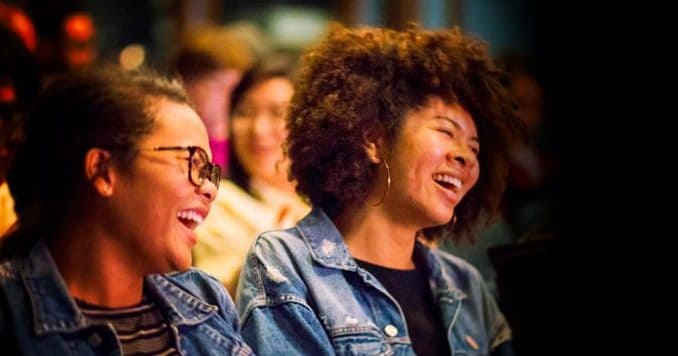
While Spring was blowing a breeze around the downtown streets on Sunday morning, the rehearsal room at the Kirk Douglas Theater was filled with people blowing ideas around – intriguing, brilliant, insightful ideas. Can Music Make Democracy? the intriguing title of a community conversation hosted by the Center Theatre Group, brought together a fine jazz trio, a panel of speakers, and a moderator to keep it all moving with a community minded audience from Culver City and beyond.
The moderator, Deborah Piver, has worn many hats at CTG and is currently a Resident Teaching Artist. The panel – Daniel Ho, a multiple Grammy winning musician and producer from Hawaii; Steve Lehman, a professor of music at Cal Arts and the creator of #1 Jazz Album of the Year as noted by the Los Angeles Times and NPR; and Janice Rhoshalle Littlejohn, Senior Editor for the Los Angeles Review of Books, author of multiple books and currently working on a documentary about women in jazz.
Gently focused towards the upcoming Block Party presentation of Critical Mass Performance Group’s ‘Ameryka’ at the KDT, the discussion began with the historical concept of the Jazz Ambassadors. This was a program from the United States State Department during the Cold War, where jazz musicians were sent to tour in Eastern European countries behind the ‘iron curtain’ as a kind of diplomatic advertisement for the freedom and the creativity of the United States. Littlejohn pointed out the power that Louis Armstrong discovered he wielded when he refused an assignment to travel to Russia, saying he was not happy about the lack of federal support for the civil rights crisis in Alabama, which was then trying to integrate the schools. The State Department grew alarmed that the domestic problem was impacting international relations – National Guard troops were finally sent in to protect the students, and Armstrong went to Russia with a smile.
A theme that came up over and over was how arts and music are funded. While most of Europe and Canada offer art subsides and support to keep the arts available to everyone, in America it’s much more closely tied to the market, and what might be profitable. Does this enhance the democratic aspect of music, or stifle it? Pros and cons were brought forward, but there were benefits to each approach.
The discussion of music stayed on jazz, both as an art form and an African American phenomenon, the reach of personalities were noted (like Louis Armstrong) and the lack of women’s inclusion was mourned. Littlejohn stated that within the traditional jazz bands it was unusual to see women beyond the ‘all the men are enlisted’ moment of WWII, and Lehman observed that the arts-supporting cultures of Northern Europe had created so many homegrown jazz musicians, it was not unusual to hear this African American art form without any black musicians onstage. Opening a dialogue around both of these absences, the idea that the origins of jazz needed to be kept in the arraignment was coupled with the need for inclusion of talent from every quarter.
John Freeland, Jr. a member of the audience asked “What is the melody of democracy?” and that got the panel to riffing on some possible themes. Ho offered that one of the central treasures of jazz was that “It’s not structured. It’s a reactive and interactive art form that requires us to listen closely. We have to listen to each other.”
Whether or not music can make democracy wasn’t truly settled by the end of the conversation, but there was no doubting that it was a vital factor in culture and communication.
Judith Martin-Straw


Be the first to comment